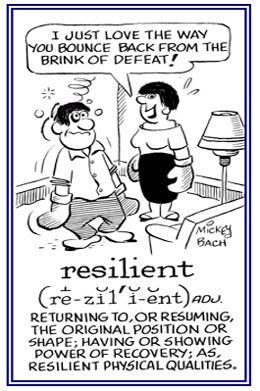re-, red-
(Latin: back, backward, again; used as a prefix)
"Some people simply resign when they're ready to stop working in one place so they can get a different job."
2. To accept or to submit to something that is unchangeable or incapable of being avoided or prevented: "The 98-year old lady resigned herself to the fact that she would die soon.""His father will be resigning from any further association with or participation in the activities of the political party."
3. Etymology: from Old French resigner, from Latin resignare, "to check off, to cancel, to give up"; from re-, "opposite" + signare, "to make an entry in an account book"; literally, "to mark".The meaning of "give up a position" is first recorded in the late 14th century.
2. Formally to renounce one's position in a government or other organizational situation: The king decided to resign from the throne so he could marry the woman he loved.
3. To agree or to accept something as inevitable: Jeremy feels that he must resign himself to staying home on Friday night.
Because of a perceived conflict of interest, Debora was forced to resign from her job; however, after an investigation, she was cleared of any charges and so she was able to re-sign her contract and to resume her work.
2. To draw back from an agreement, contract, statement, etc.: Mr. Gregory, the businessman, is resiling or bowing out, chickening out, backing down, backing off, and pulling out of the agreements he made with his employees.
3. To spring back; to spring away from an impact: Certain particles do not resile, instead they unite after they collide.
2. Elasticity; the ability of matter to snap back quickly into shape after being bent, stretched, or deformed: Even the resilience of rubber tires can be decreased by very cold temperatures.
3. The ability of a person to recover, or to rebound, quickly from a setback: Despite Floyd's serious illness, his resilience when he returned to his job was considered amazing by his fellow workers.
4. Etymology: from Latin resiliens, resilire, "to rebound, to recoil"; from re- "back" + salire, "to jump, to leap".
2. The power or ability of a material (metal, plastic, etc.) to return to an original form, position, etc., after being flexed, compressed, or extended; elasticity: Some fabrics; such as, wool and silk, have natural resiliency and others can be chemically treated to impart a certain amount of resiliency.
Resilient children can usually recover from minor accidents more quickly than other less resilient ones.
2. Regarding something that can fly back quickly into shape after being twisted, expanded, or squashed: Rubber is one of the most resilient products that we know about.3. Marked by the ability to recover readily, as from misfortune or disastrous situations: "The killers who struck this week are brutal and violent," President Bush said, "but terror will not have the final word because the people of India are resilient. They can withstand this trial."
4. Descriptive of something that is capable of regaining strength, being healthy again, or having successful results after something bad has occurred: Many people are hoping that the economy will be resilient and recover from the monetary losses that took place.
5. With computer technology, the ability to recover from a failure: The resilient site was "up" and available to users again after having been "down" for over two hours because of technical problems.
6. Etymology: from about 1626, from Latin resiliens, resilire, "to rebound, to recoil"; from re-, "back" + salire, "to jump, to leap".

Go to this Word A Day Revisited Index
so you can see more of Mickey Bach's cartoons.
2. To fight or to hold out against something: The burglar tried to resist being arrested after being caught stealing the jewels.
3. To avoid or to refuse something: It was so hard for Nancy to resist eating ice cream because she was on a diet to lose weight.
4. To withstand something: James tried to resist the cold outside by putting on warm boots, a winter coat, and a woolen scarf.
2. Opposition offered by one force to another: The aggressive mob presented no resistance to the police officers when asked to disperse.
3. Immunity of a person's body toward diseases and germs: Somehow Tom showed good resistance in getting the flu like everybody else in his family.
4. The force that decelerates a moving vehicle or object: Most cars are made to lessen wind resistance by being very smooth and without any sharp hinderances.
5. The absence of responsiveness to an insecticide, drug, etc.: Some plants and insects have shown resistance to certain chemicals caused by continued exposure or genetic variation or mutation.
An example can be demonstrated when two tuning forks that are tuned to the same frequency are held close to each other and one is struck, then the other one will begin to vibrate.
Acoustic resonances exist in the human body, in which the structures of the head and throat give the voice its tone.
2. A quality which makes something personally meaningful or important to other people: "The story that the speaker presented had a great deal of resonance with the audience."2. Strongly affecting someone; especially, with a particular quality: "Her speech was resonant with meaning and understanding of the situation."
2. A device or part that produces sound or microwaves.
3. To maximize or to minimize the amplitude or other characteristic of a quantity.


